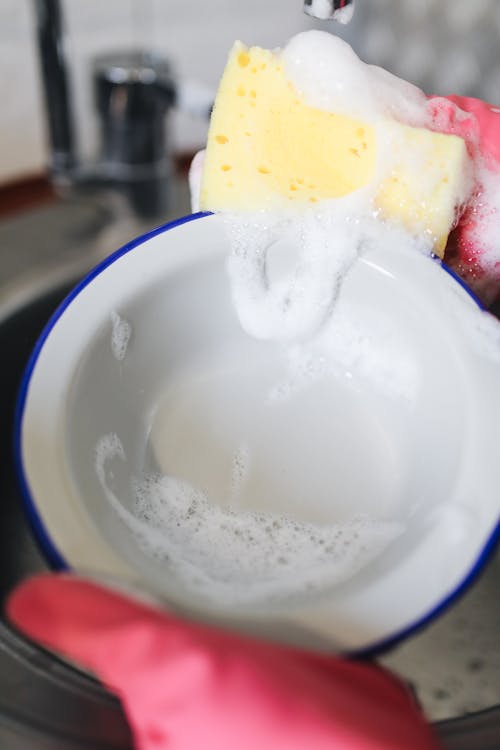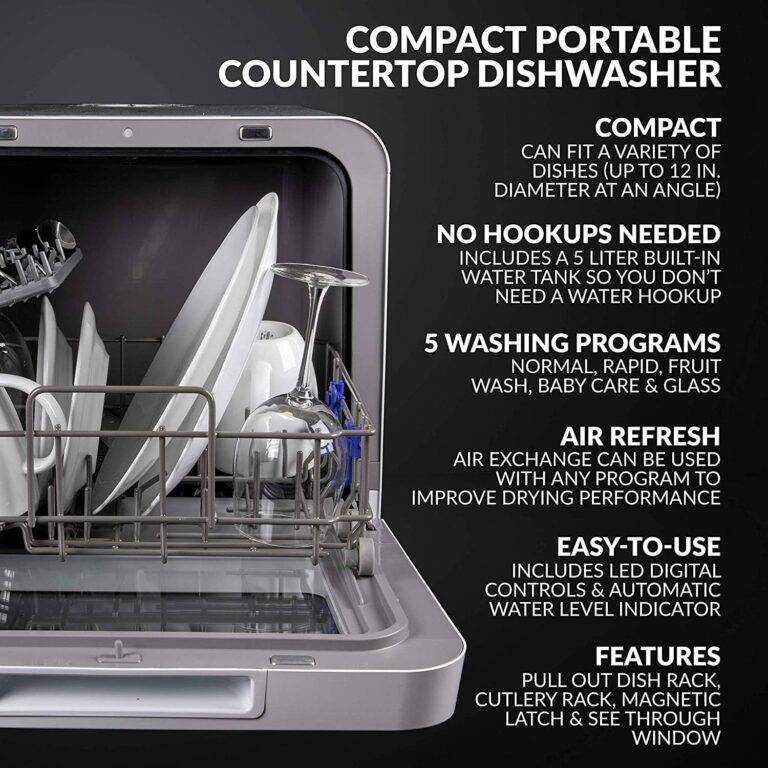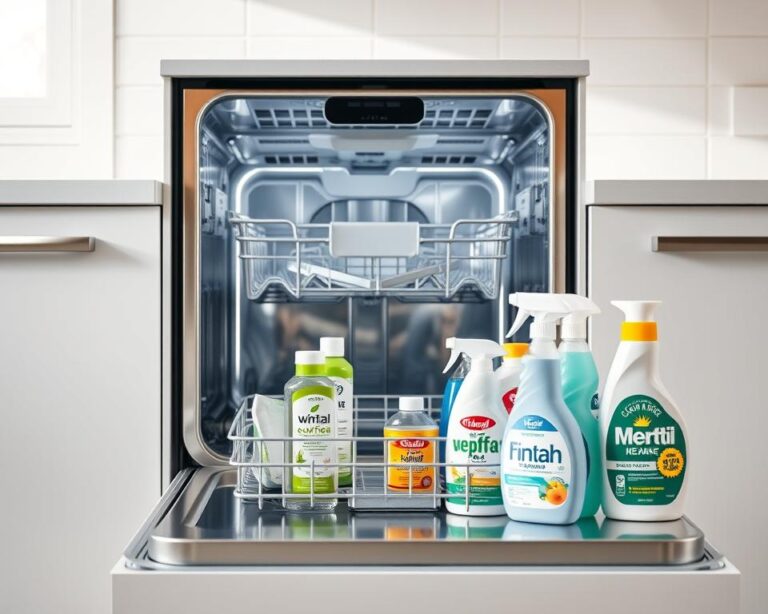Maintaining a clean dishwasher is crucial for not only the appliance’s performance but also for ensuring your dishes come out sparkling clean. Regular cleaning can prevent cloudiness caused by mineral deposits and detergent residue, which is especially important when using gel detergents that may leave chlorine bleach residue and spotting issues. For eco-friendly dishwasher cleaning, vinegar for dishwasher cleaning is a highly effective solution. It helps dissolve mineral deposits and maintain a hygienic environment, all while being easy on the wallet.
In this article, we will explore the best way to clean your dishwasher, utilizing efficient methods and practical tips that promote optimal functioning and hygiene. From recognizing the signs indicating it’s time for a clean to implementing effective DIY techniques, we’ll equip you with all the dishwasher cleaning tips necessary for long-term maintenance and sparkling results. Whether you are a new homeowner or simply seeking to improve your current cleaning routine, understanding these techniques can significantly enhance your dishwashing experience. Let’s dive into the essentials of maintaining a dishwasher that not only works efficiently but also keeps your dishes pristine1.
Understanding the Importance of Dishwasher Cleaning
Regular cleaning of your dishwasher holds significant importance for both the longevity of the appliance and maintaining hygiene in dishwashing. It is recommended to clean a dishwasher on a monthly basis, with a suggested cleaning duration ranging from once a month to not longer than every six months, depending on usage frequency and dirt accumulation2. If left uncleaned, food residues can lead to a buildup of unwanted minerals, grease, grime, and limescale, ultimately decreasing the dishwasher’s effectiveness over time2. Ensuring proper dishwasher maintenance not only enhances the performance but prevents unpleasant odors and unsanitary conditions that can affect the dishes and kitchen environment.
Utilizing effective cleaning methods like vinegar can significantly improve hygiene in dishwashing. Soaking removable parts in a mixture of warm water and white vinegar for about 20 minutes effectively eliminates grime2. Another option involves running a hot cycle with a cup of white vinegar placed on the top rack, which helps in removing odors and buildup2. In addition, baking soda can be sprinkled on the floor, followed by a hot cycle, for further cleaning benefits2. Addressing cleanliness around the dishwasher door and gasket is essential too; using hot water mixed with vinegar to wipe these areas can prevent the growth of mold and mildew.
Signs You Need to Clean Your Dishwasher
Homeowners should be vigilant about the signs you need to clean your dishwasher. If you frequently pull out dirty dishes after a wash cycle, this is a clear indication that your dishwasher requires immediate attention. This issue often arises from the buildup of grime and food particles that can clog the spray arms and filters, leading to ineffective cleaning and the persistent presence of foul odors34.
Another telltale sign is the emergence of visible residue on your dishes. Over time, limescale, grease, and mineral deposits accumulate inside the dishwasher, making it less efficient and leaving a bitter taste on your clean plates5. Regularly checking for these signs helps prevent further complications and ensures your dishwasher functions optimally.
Foul odors might indicate trapped food particles, mold, or mildew that thrive in damp environments. If your dishwasher begins to emit unpleasant smells, it is time to undertake a thorough cleaning. Addressing these issues proactively can save you from costly repairs and extend the life of your appliance35.
The Best Way to Clean Dishwasher
To achieve the best way to clean dishwasher, a systematic approach will yield the most effective cleaning solutions. Regularly cleaning your dishwasher is crucial; ideally, it should be thoroughly cleaned every month, addressing the entire interior, including the door, gasket, and filter6. This commitment to cleanliness not only enhances efficiency but also extends the lifespan of the appliance.
Vinegar is a favorite among methods to clean dishwasher and is effective in tackling odors and grime. Placing a cup of white vinegar on the top rack and running the hottest cycle can work wonders6. For an extra punch, consider using approximately 1/2 cup of baking soda, letting it sit for 30 minutes to 1 hour before selecting a Heavy Duty cycle with a Sanitize setting7.
In terms of deep cleaning, bleach serves as a strong option. Pouring one cup of bleach into a dishwasher-safe bowl and running a full cycle can eliminate tough stains, mold, and mildew6. However, employ caution and ensure the dishwasher is empty beforehand.
Maintaining the dishwasher involves routine tasks such as cleaning the filter after each use and prewashing dishes to minimize food debris6. Air-drying the interior by leaving the door open post-cycle can also help prevent odors and mold growth6. By incorporating these methods, you can effectively keep your dishwasher in pristine condition.
DIY Dishwasher Cleaning Techniques
Keeping your dishwasher clean is essential for its optimal functioning. Effective DIY dishwasher cleaning can be achieved using simple, homemade cleaning solutions like vinegar and baking soda. These ingredients are not only affordable but eco-friendly options to eliminate grime and maintain a fresh smell.
The process begins by cleaning the dishwasher filter, which should be done regularly. After each use, homeowners can remove trapped food from the silverware baskets and the bottom of the appliance to prevent odors and mildew buildup. Running a cycle with vinegar and baking soda can tackle stubborn stains in the interior corners and crevices where residue accumulates. This method effectively removes hard water deposits and mineral buildup commonly found in stainless steel dishwashers8.
For a deep clean, homeowners can soak removable parts in a mixture of warm water and white vinegar for around 20 minutes. This step aids in dislodging any leftover grime. Additionally, it is recommended to avoid letting more than six months pass without a thorough cleaning of the dishwasher9. Regular maintenance can help preserve not only the appliance’s appearance but its efficiency as well9.
Integrating these DIY dishwasher cleaning techniques into your routine will ensure a spotless appliance. Using homemade cleaning solutions like vinegar and baking soda will keep your dishwasher in tip-top shape, offering both sustainability and effectiveness in maintaining a sparkling clean kitchen.
Dishwasher Cleaning Tips for Homeowners
Homeowners can greatly benefit from implementing simple dishwasher cleaning tips as part of their regular maintenance routine. Prioritize cleaning the dishwasher filter every month to prevent debris buildup and unpleasant odors, ensuring optimal performance10. Utilize white vinegar by placing a cup of it in a dishwasher-safe container and running a hot water cycle; this not only disinfects the appliance but also helps break down residue10. Properly loading the dishwasher enhances its cleaning capability, so remove excess grease and strategic placement of items are essential steps10.
Don’t overlook the importance of cleaning the gasket monthly with a mixture of 3 cups of water and half a cup of vinegar; this helps avoid odors and mold growth10. Regularly checking and cleaning the spinning spray arms prevents clogs from affecting cleaning efficiency10. Adopting these practices promotes a hygienic kitchen environment while extending the dishwasher’s lifespan, saving you money on repairs11. A clean dishwasher operates more efficiently, using less water and energy, which benefits both the environment and your wallet11.
Set aside just 1-2 minutes daily for maintenance tasks and about 5 minutes weekly for cleaning11. Monthly thorough cleanings can be completed in 20-30 minutes, making it manageable for any homeowner11. Natural cleaning solutions like vinegar and baking soda provide effective, budget-friendly options that dissolve mineral deposits and cut through grease11. For dishwashers with significant grease buildup, consider using a commercial cleaner for an initial clean, then maintain with regular care11.
How to Deep Clean Your Dishwasher
Understanding how to deep clean your dishwasher is vital for effective maintenance. A thorough cleaning should ideally be performed every 4-6 months to prevent any serious residue buildup12. Monthly cleanings can be done using Affresh tablets or even a cup of lemon juice, which effectively helps combat soap scum and mineral deposits from hard water12. Ensuring your dishwasher operates at a minimum temperature of 120 degrees Fahrenheit will also contribute to more efficient cleaning12.
To initiate a proper deep clean, start by removing the filter and soaking it in a mixture of hot water and distilled white vinegar for 15 to 30 minutes13. Likewise, the sprayer arms can be cleaned by letting them soak in a similar vinegar and water solution for 15 to 20 minutes13. Special attention should be paid to the gaskets and hinges, using a paste of baking soda and water to clean these delicate areas, letting it sit for 10 to 15 minutes for optimal results13.
Don’t forget to clean the inside of the dishwasher’s walls by wiping down corners and edges thoroughly. Afterward, run the dishwasher with a cycle of baking soda and vinegar down the drain to break up grease and food residue13. Regular maintenance is crucial, as dishwashers should be cleaned at least once a month to maintain efficiency13. By applying these tips, you will not only extend the appliance’s lifespan but ensure that it continues to operate at peak performance.
Dishwasher Maintenance Guide for Longevity
Maintaining your dishwasher is essential for ensuring its performance and longevity. This dishwasher maintenance guide emphasizes the importance of regular checks to keep all components functioning properly. Regularly clean the filter, ideally every month, to optimize wash performance and avoid grittiness on your dishes14. If you discover any holes in the filter, replacing it promptly is crucial to prevent costly damages to the pump and motor seals14.
Don’t overlook the door seal; cleaning it with white vinegar helps eliminate odors and mold while ensuring a proper seal to prevent leaks14. To address any hard-water residue you may encounter, use a citric-acid-based cleaner like Affresh or Finish monthly14. Hard water affects your dishwasher’s efficiency, leading to mineral deposits and cloudiness on your dishes, hence the need for regular checks in these conditions15.
It is advised for homes in hard water regions to incorporate regeneration salt in the dishwasher’s water-softening system. This addition enhances cleaning effectiveness and reduces spotting on dishes14. Follow a monthly cleaning regimen using products like Finish® dishwasher cleaners to tackle tough stains and limescale build-up15. Such practices will not only maintain the appliance but also extend its life and operational efficiency, ensuring sparkling clean results every time.
Common Dishwasher Cleaning Hacks
Keeping your dishwasher clean can be effortless with some clever dishwasher cleaning hacks. One of the most effective tips and tricks is to use citrus peels. Placing lemon or orange peels in the dishwasher combats odors naturally while leaving a fresh scent behind. This method is a fantastic example of easy cleaning methods that engage the senses.
Regular maintenance is essential. Cleaning out bits of food daily can help prevent odor problems in dishwashers16. It is recommended to wipe the door and door gasket weekly to remove greasy residue, ensuring that the dishwasher remains in tip-top shape16. Another easy cleaning method involves running the dishwasher with vinegar in an empty load. This helps fight residue and buildup, which can hinder performance16.
For those looking to elevate their cleaning routine, utilizing a rinse aid can help prevent soap scum and mineral buildup caused by hard water17. Furthermore, a simple solution of baking soda mixed with water can freshen the appliance while removing stains18. Avoid using bleach or cleaners with bleach, especially for stainless steel interiors, as they may damage the machine16.
Keeping Your Dishwasher Sparkling Clean
To ensure that your dishwasher remains in top condition, establishing daily cleaning habits is essential. Regularly rinsing the spray arms and checking for clogs in the drain can significantly contribute to keeping the dishwasher clean. Additionally, running a vinegar cycle monthly not only eliminates odors but also helps remove mineral deposits that can accumulate over time19.
Incorporating routine maintenance into your household can create a shared responsibility among family members. Engage everyone in maintaining kitchen cleanliness, whether it’s wiping down the exterior or checking the filter after each wash. This collaborative effort fosters teamwork while keeping your dishwasher functioning efficiently20.
For optimal results, consider running cycles every two weeks with vinegar and baking soda, which effectively combat food buildup and grime. Keeping your appliance in stellar condition requires commitment, but the benefits of a clean dishwasher—like improved performance and a fresher kitchen atmosphere—are well worth the effort21. For further insights into maintaining your dishwasher, visit this resource.

FAQ
How often should I clean my dishwasher?
It’s recommended to clean your dishwasher at least once a month. Regular maintenance helps prevent build-up and ensures effective operation.
Can I use vinegar for dishwasher cleaning?
Yes, vinegar is an excellent eco-friendly option for cleaning your dishwasher. It helps eliminate odors and break down grime effectively.
What are the signs that my dishwasher needs cleaning?
Signs include dirty dishes even after a wash cycle, foul odors, and visible grime or residue inside the appliance.
What DIY methods can I use to clean my dishwasher?
You can create a DIY cleaning solution using vinegar and baking soda. Just place a cup of vinegar in the top rack and run a hot cycle, followed by a sprinkle of baking soda in the bottom and another run through.
Are there specific products I should use for dishwasher cleaning?
Look for commercial dishwasher cleaning products that are safe for your appliance. Always check the labels for compatibility and effectiveness.
What maintenance practices can help extend my dishwasher’s life?
Regularly inspect hoses for leaks, ensure proper drainage, and avoid overloading the dishwasher. These practices contribute to a longer life for your appliance.
What are some common dishwasher cleaning hacks?
Use citrus peels to combat odors, run a cycle with a cup of vinegar or baking soda, and utilize dishwasher-safe items like sponge holders for quick cleaning.
Why is deep cleaning my dishwasher important?
Deep cleaning removes stubborn grime and bacteria that regular cleaning may miss. It helps ensure optimal performance and hygiene for your dishes.



